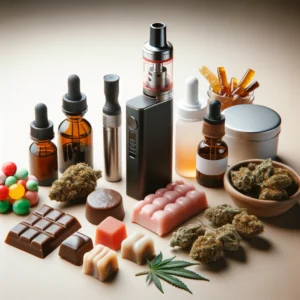 As avid users of cannabis, we often find ourselves wondering about cannabis detection times—how long the effects of this magical plant will last. Whether you’re a recreational user or rely on cannabis for its medicinal properties, it’s important to understand the duration this substance remains in your system. The truth is, there isn’t a definitive answer, as many factors can influence the cannabis detection time in your body and how it affects you. As a seasoned cannabis author and advocate, I have conducted extensive research on this topic and am excited to share with you everything you need to know about the cannabis detection time.
As avid users of cannabis, we often find ourselves wondering about cannabis detection times—how long the effects of this magical plant will last. Whether you’re a recreational user or rely on cannabis for its medicinal properties, it’s important to understand the duration this substance remains in your system. The truth is, there isn’t a definitive answer, as many factors can influence the cannabis detection time in your body and how it affects you. As a seasoned cannabis author and advocate, I have conducted extensive research on this topic and am excited to share with you everything you need to know about the cannabis detection time.
This blog post will dive into the science behind THC (the active compound in marijuana) metabolism rates, different ingestion methods, frequency of use, and other crucial factors that contribute to varying levels of detection. Knowing how our bodies handle THC helps us make smart choices and avoid problems like failed drug tests. So let’s put on our lab coats and dig deep into the question – How Long Does Cannabis Stay In Your System?
Introduction to the topic of cannabis and drug testing
 As a cannabis enthusiast and advocate, I’m well aware that despite increasing legalisation in many parts of the world, drug testing can still pose challenges for those of us who enjoy cannabis in our free time. Knowing how long cannabis stays in your system is key for anyone taking drug tests for work.
As a cannabis enthusiast and advocate, I’m well aware that despite increasing legalisation in many parts of the world, drug testing can still pose challenges for those of us who enjoy cannabis in our free time. Knowing how long cannabis stays in your system is key for anyone taking drug tests for work.
Whether it’s for a job, a sport, or even just a routine medical check-up, the fear of being caught out can be a constant worry.
So, what exactly do drug tests look for when it comes to cannabis, and is there really any way to pass them if you’ve been indulging in a little bit of (completely legal) THC?
Let’s deep dive into the world of cannabis and drug testing together, and explore how we can navigate these tricky waters as responsibly and knowledgeably as possible.
Explanation of how cannabis is metabolized in the body
As a cannabis author, I find it fascinating how our bodies break down and metabolize different compounds of the plant. Smoking or ingesting cannabis sends it into the bloodstream and then to the liver. The liver then breaks down the compounds into different molecules, including THC, the psychoactive compound responsible for the “high” associated with cannabis use. The metabolites are then excreted through the kidneys and leave the body through urine. How fast your body processes cannabis depends on how often you use it, its strength, and your metabolism. Understanding how cannabis is metabolized in the body can help us better understand its effects and potential therapeutic benefits.
Factors that can affect the length of time cannabis stays in your system, such as frequency of use and metabolism rate
 As an avid cannabis enthusiast, it’s important to grasp the various factors that can impact the cannabis detection time in your system. Frequency of use and metabolism rate, for example, play significant roles in determining how quickly THC is metabolized and eliminated.
As an avid cannabis enthusiast, it’s important to grasp the various factors that can impact the cannabis detection time in your system. Frequency of use and metabolism rate, for example, play significant roles in determining how quickly THC is metabolized and eliminated.
Your metabolism rate significantly affects how fast your system metabolizes and clears THC. That’s because THC is stored in fat cells, so individuals with a higher body fat percentage may have a longer detection window than those with a lower body fat percentage.
So whether you’re a seasoned smoker or a cannabis newbie, it’s always a good idea to keep these factors in mind to ensure you’re fully aware of the potential lingering effects of your favorite herb.
Different methods of drug testing for cannabis, including urine, blood, saliva, and hair tests
With more people using cannabis for health and fun, accurate drug testing becomes more important. Cannabis can be detected through various tests, including urine, blood, saliva, and hair analyses. Each type of testing has its own advantages and disadvantages, making it crucial to select the right one based on individual circumstances. For example, urine tests are the most common and cost-effective option, but they only detect recent drug use. Blood tests are more precise but expensive, while saliva tests are convenient but less reliable. Hair testing is the least common but can detect drug use from up to 90 days prior. Understanding the pros and cons of each testing method is essential for anyone involved with cannabis, whether it’s for personal or professional purposes.
Average cannabis detection times for each method of testing
As cannabis continues to be a hot button topic, it’s become increasingly important to accurately and efficiently test for its presence in a variety of settings. Understanding each testing method’s average detection time is crucial. From saliva swabs to hair samples, each method offers its own unique benefits and drawbacks. Whether you’re trying to pass a drug test or simply curious about the science behind it all, knowing which tests have the longest detection times can give you the insight you need to make informed decisions. So, let’s dive into the world of cannabis testing and explore the average detection times for each method.
With the broadening landscape of cannabis use and acceptance, knowing the average cannabis detection time for each method of drug testing is key. Whether it’s urine, blood, saliva, or hair tests, each has its own timeframe for detecting THC, influencing decisions around consumption and testing readiness.
Tips for speeding up the process of eliminating cannabis from your system
 As a cannabis author, I understand how important it is to know how to rid the body of cannabis as quickly as possible. While the process of detoxifying can vary depending on factors such as metabolism, body weight, frequency of use, and method of consumption, there are certain tips to speed up the process.
As a cannabis author, I understand how important it is to know how to rid the body of cannabis as quickly as possible. While the process of detoxifying can vary depending on factors such as metabolism, body weight, frequency of use, and method of consumption, there are certain tips to speed up the process.
Drinking plenty of water can help clear any cannabis traces from your system. Secondly, exercise regularly as it helps speed up your metabolism and helps eliminate toxins through sweating.
Also, consume diuretic foods such as cranberry juice or coffee as it can help increase urine production, which means you’ll flush out cannabinoids faster. Keep these tips in mind, and you’ll be one step closer to getting a clean bill of health.
The potential consequences of failing a drug test for cannabis
A failed cannabis drug test can lead to serious consequences beyond losing a job or promotion opportunity. In fact, the potential consequences can be long-lasting and severe. Depending on the situation, it could result in getting fired from your current job or even potentially losing your professional license. Additionally, it could have negative ramifications on your personal life, such as legal troubles or the loss of custody of your children. It’s essential to remember that even if you live in a state where cannabis is legal, it’s still illegal at the federal level and could result in federal charges. It’s essential to weigh the risks before making decisions that could have life-changing consequences.
Debunking common myths about ways to pass a drug test for cannabis
As a cannabis enthusiast, I’ve heard my fair share of myths and tall tales about how to pass a drug test for cannabis. Unfortunately, most of these so-called “solutions” are nothing more than baseless rumors that could end up costing you your job, your freedom, or worse. From drinking gallons of water to chugging detox drinks, these methods may seem like a surefire way to beat a drug test, but they could lead to disastrous results. As someone invested in the success and wellbeing of the cannabis community, it’s my duty to debunk these common drug test myths and provide you with the real facts. So sit back, relax, and let’s clear the air (pun intended) on how to pass a drug test for cannabis once and for all.
The importance of being aware of how long cannabis can stay in your system
As a cannabis author, I feel it is essential to stress the importance of being informed about how long the drug can linger in your system. While some people may use it recreationally and believe it won’t affect them in the long run, cannabis can linger in your system for weeks to months, making awareness crucial. This can have serious implications, especially for those who are subject to drug tests for work or legal reasons. Additionally, it is important to note that the effects of cannabis can vary greatly from person to person and can impact things like judgment, memory, and coordination. By being aware of the potential long-term effects of cannabis use, individuals can make informed decisions and take necessary precautions to ensure their health and safety.
Encouragement to always consume responsibly and be mindful of any upcoming drug tests
As a cannabis author, I am an advocate for responsible consumption. It’s important to remember that when we consume, we must do so in a mindful and safe manner – not only for our own health, but for the health and safety of others. It’s also important to keep in mind that drug tests may be on the horizon, so we should always be aware of how our consumption may affect our test results. Whether you’re a regular consumer or an occasional one, always consume responsibly and be mindful of any upcoming drug tests. Let’s work together to promote safe and responsible cannabis use.
As we come to the end of this blog post, it is clear that cannabis and drug testing is a complex and nuanced topic. We have explored how cannabis is metabolized in the body and the various factors that can affect how long it stays in our system. We have also delved into the different methods of drug testing for cannabis and their average detection times. Moreover, we have discussed ways to speed up the process of eliminating cannabis from our system and debunked common myths about passing a drug test. It is important to remember that failing a drug test for cannabis can have serious consequences, whether it be in your personal or professional life. Therefore, I urge you to always consume responsibly and be mindful of any upcoming drug tests. However, let us not forget that while being aware of these things is crucial, we should also push for more education and understanding about cannabis and its potential benefits. With responsible consumption and proper knowledge, we can begin to break down the stigma surrounding cannabis use. Together, let us move towards a more informed and progressive society when it comes to this controversial plant.






